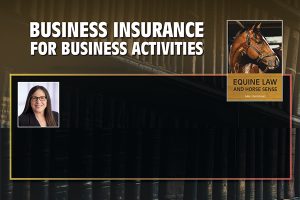Business Insurance For Business Activities
Click here to read the complete article
258 – July/August, 2024
 By Julie I. Fershtman, Attorney at Law · www.equinelaw.net
By Julie I. Fershtman, Attorney at Law · www.equinelaw.net
Some riding instructors, boarding stable owners, and horse trainers have full-time “day jobs” but carry out their equine businesses on the side. When these equine professionals assume they need no business liability insurance, they could be making a very costly mistake. A major claim could occur, and their insurance company might deny coverage. Over the years, some people in the horse industry have learned this the hard way when they defended themselves against personal injury lawsuits–and battled in court with their insurance companies when coverage was denied for the lawsuits. A few real-life examples follow:
• In a Connecticut case, a couple’s horse boarding business was sued after one of their boarded horses kicked a visitor. At the time, they had no business insurance in effect–just a homeowner’s liability insurance policy–but the homeowners insurer denied coverage based on its policy’s “business pursuit” exclusion. In an extensive legal battle, that went up to that state’s Supreme Court, the court found that the policy excluded coverage because facts showed that the stable owners operated the horse business continuously, and they declared that business on their tax returns, reflecting a profit motive.
• In a New York case, the homeowner operated a day care but also had an equine boarding business. One day, a child was permitted to be present when a boarded horse was led from a pasture, but the horse kicked the child in the head. Denying coverage, the insurance company cited its policy’s exclusion for injuries “arising out of business pursuits of an insured.”
• In a South Carolina case, a husband and wife owned, bred, sold, and showed champion dogs, but one day one of their dogs bit its handler, resulting in a lawsuit. Although they operated their business under a business name and engaged extensively in business activities, which included competing in dozens of shows each year, they had no business insurance. Their homeowners insurer denied coverage for the lawsuit citing the policy’s “business pursuit” exclusion, and a court agreed, holding that the injury generating the suit occurred in connection with a business activity, and the business had a profit motive. Though the homeowners argued that their business wasn’t profitable, in an effort to challenge the “business pursuit,” the court was not persuaded. It found that they nevertheless had a profit motive, regardless of lack of profit.
Click here to read the complete article
258 – July/August, 2024










